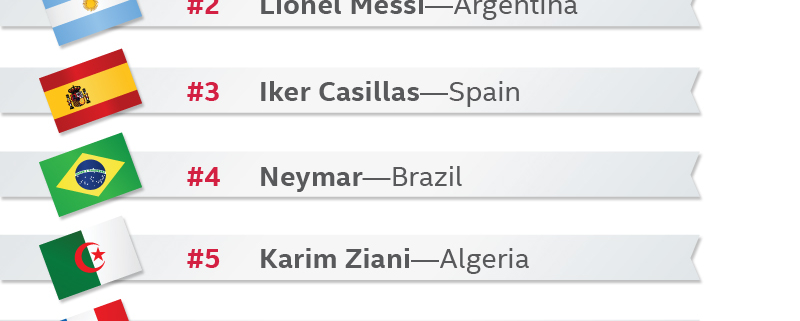Don’t Get Kicked By Football Players Online
The biggest sporting event of the year just kicked off. If you’re not a football fan (that’s soccer for us Yanks), this is the ultimate goal and it’s just getting started. Many fans will head to Brazil to watch these games and their favorite players, but many more fans will flock online to find out information about the players and teams.
 Cybercriminals once again are taking advantage of these large numbers and have pounced on the eagerness of fans of the world’s most popular sport. Portugal’s Cristiano Ronaldo dos Santos Aveiro just barely edges other football stars as the world’s riskiest football player to search for online and tops the McAfee “Red Card Club.”
Cybercriminals once again are taking advantage of these large numbers and have pounced on the eagerness of fans of the world’s most popular sport. Portugal’s Cristiano Ronaldo dos Santos Aveiro just barely edges other football stars as the world’s riskiest football player to search for online and tops the McAfee “Red Card Club.”
The McAfee “Red Card Club” is a list of eleven Brazil bound players whose web pages are considered to be risky for fans to search for online. Following Ronaldo are Argentina’s Lionel Messi, Spain’s Iker Cassillas, Brazil’s Neymar and Algeria’s Karim Ziani.
The sites most likely to be risky are those offering videos showing the athlete’s skills, and screensaver downloads. These rigged sites are just waiting to trick you into giving up personal information so that the thieves can steal your identity or get ahold of credit card information and max out your cards.
The study uses McAfee® SiteAdvisor® site ratings, which indicate which sites are risky when attached to football players’ names on the Web and calculates an overall risk percentage.
So what’s an excited football fan to do? While it’s probably not feasible for us to stop searching for information about these stars, we can make sure we are safe while doing so. Here are some tips for you to stay safe online:
- Be suspicious — If a search turns up a link to free content or too-good-to-be-true offers, it usually is.
- Be extra cautious when searching on hot topics—Cybercriminals set up fake and malicious sites that dominate these time-sensitive search results.
- Use web protection— Make sure to use a safe search tool that will notify you of risky sites or links before you visit them. McAfee SiteAdvisor software can be downloaded for free here.
- Check the Web address—Look for misspellings or other clues that the link might be directed to a phony website.
- Protect yourself—Use comprehensive security on all your PCs, Macs, smartphone and tablets, like McAfee Live Safe™ service, that comes with McAfee SiteAdvisor, a complimentary tool that protects your from going to risky websites and prevents malicious downloads.
Stay safe online!
Robert Siciliano is an Online Security Expert to McAfee. He is the author of 99 Things You Wish You Knew Before Your Mobile was Hacked! Disclosures.


























